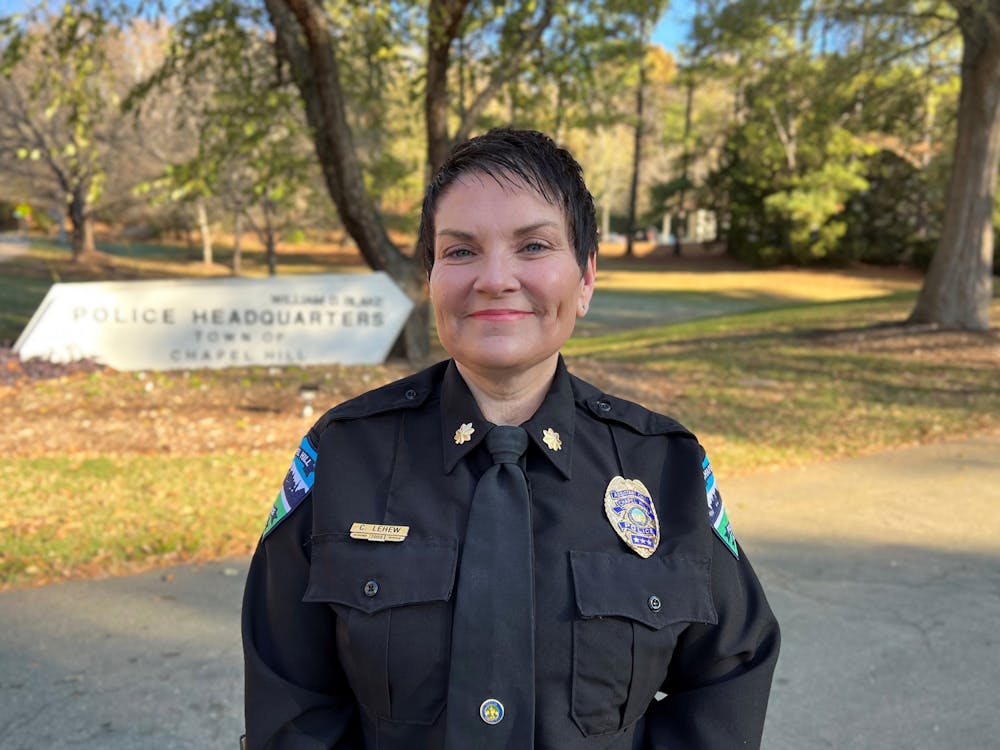Lastly, crime management is always a focus and crime reduction. So we will work with both the criminal justice system and our community partners. It always will require us to look at alternatives for discretionary arrests of low-level offenses.
DTH: The CHPD signed the 30x30 Pledge in 2022 with the goal of having 30 percent of police recruits be women by 2030 as well as increasing the representation of women in all ranks. How is the department doing regarding that pledge?
CL: Yes, so we currently have a Basic Law Enforcement Training Academy taking place and we have two women in that class. We're really focusing our efforts on being intentional about recruiting women. That means going to universities or colleges and really talking about the law enforcement career.
What we've learned as we welcome Generation Z to the workforce and we ask them, "Hey, what are you looking for?" They don't want to hear the basic requirements about what you need to be a police officer. They want to hear, "Hey, what is the return in the community?" or "How do I impact the community?" We are switching from the traditional way of pushing out job postings and really being intentional about listening and understanding what the generation really wants to hear.
DTH: In 2020, the Town of Chapel Hill’s Re-imagining Community Safety Task Force resolved to stop the CHPD from conducting regulatory stops (e.g., expired tags or a broken taillight) because they often target people of color. As police chief, do you plan to address further disparities in policing? How so?
CL: It's ongoing and it's being very mindful, bringing the team together, looking at the data, making sure that we're really mindful of any disparities that are occurring and continuing to monitor that. You have to have metrics to measure and track successes and failures to make sure that we're meeting engagement strategies. It's also making sure that all voices are heard, people come together to understand what people are feeling, keeping an open mind about that and then really working together to determine where those disparities are and how we move forward.
DTH: After the incident involving Alcohol Law Enforcement and a UNC student in the fall, what is the CHPD doing to build relationships with and increase the education of students and community members?
CL: The University community is a strong component of our community — they're members of our community. So really keeping those communication channels open, working with the CCC through the Downtown Partnership, having really good conversations, being very transparent and open about incidents when they occur and making sure we're working with the University to make sure that they are receiving the same information that we are. There's real power in communication.
DTH: The CHPD’s Crisis Unit allows counselors to respond to crises with police officers. How is the Crisis Unit going? Do you plan to continue to expand the Crisis Unit?
CL: This summer, we added two peer support specialists, which are persons who have lived experience either in homelessness or substance use or barriers faced in the criminal justice system. Adding those two peer support specialists allows those individuals to really meet people where they're at. It's just a great addition to our crisis team.
We boast that we're one of the first agencies in the country that had that co-responder model. We're happy to say that others are catching up to us now. I think we need to continue to look at the appropriateness of response and really have good conversations about that. Perhaps there's a social worker that we could place in our 911 center to triage calls and just to have that right response.
The Crisis Unit is very dear to my heart. I think it's really important that we work with all of our community partners to find creative and effective responses to everybody in the community, and having the right professionals in place to respond to those noncriminal calls is essential. Yes, I do anticipate expansion of that unit over the next several years.
To get the day's news and headlines in your inbox each morning, sign up for our email newsletters.
DTH: What is one thing you want UNC students and community members to know about you?
CL: That I'm always here — I'm a phone call away. If they have a question or they want to talk about something, that they call and know that my door's open. I look forward to those conversations.
@emmymrtin
@DTHCityState | city@dailytarheel.com
Emmy MartinEmmy Martin is the 2023-24 editor-in-chief of The Daily Tar Heel. She has previously served as the DTH's city & state editor and summer managing editor. Emmy is a junior pursuing a double major in journalism and media and information science.




